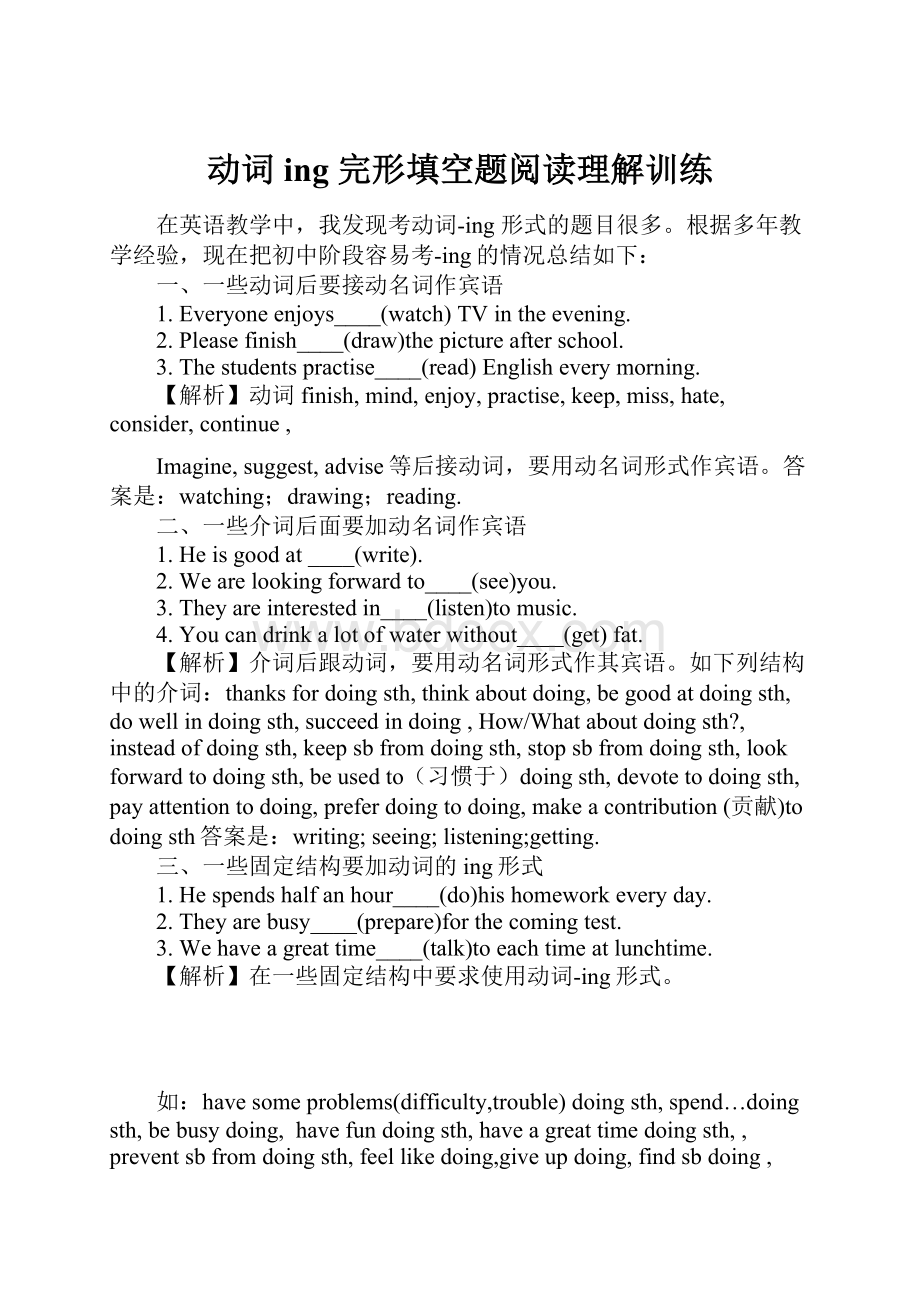动词ing 完形填空题阅读理解训练.docx
《动词ing 完形填空题阅读理解训练.docx》由会员分享,可在线阅读,更多相关《动词ing 完形填空题阅读理解训练.docx(10页珍藏版)》请在冰豆网上搜索。

动词ing完形填空题阅读理解训练
在英语教学中,我发现考动词-ing形式的题目很多。
根据多年教学经验,现在把初中阶段容易考-ing的情况总结如下:
一、一些动词后要接动名词作宾语
1.Everyoneenjoys____(watch)TVintheevening.
2.Pleasefinish____(draw)thepictureafterschool.
3.Thestudentspractise____(read)Englisheverymorning.
【解析】动词finish,mind,enjoy,practise,keep,miss,hate,consider,continue,
Imagine,suggest,advise等后接动词,要用动名词形式作宾语。
答案是:
watching;drawing;reading.
二、一些介词后面要加动名词作宾语
1.Heisgoodat____(write).
2.Wearelookingforwardto____(see)you.
3.Theyareinterestedin____(listen)tomusic.
4.Youcandrinkalotofwaterwithout____(get)fat.
【解析】介词后跟动词,要用动名词形式作其宾语。
如下列结构中的介词:
thanksfordoingsth,thinkaboutdoing,begoodatdoingsth,dowellindoingsth,succeedindoing,How/Whataboutdoingsth?
insteadofdoingsth,keepsbfromdoingsth,stopsbfromdoingsth,lookforwardtodoingsth,beusedto(习惯于)doingsth,devotetodoingsth,payattentiontodoing,preferdoingtodoing,makeacontribution(贡献)todoingsth答案是:
writing;seeing;listening;getting.
三、一些固定结构要加动词的ing形式
1.Hespendshalfanhour____(do)hishomeworkeveryday.
2.Theyarebusy____(prepare)forthecomingtest.
3.Wehaveagreattime____(talk)toeachtimeatlunchtime.
【解析】在一些固定结构中要求使用动词-ing形式。
如:
havesomeproblems(difficulty,trouble)doingsth,spend…doingsth,bebusydoing, havefundoingsth,haveagreattimedoingsth,,preventsbfromdoingsth,feellikedoing,giveupdoing,findsbdoing,can’thelpdoing,putoffdoing,keepondoing,beworthdoing,endupdoing,goshopping/swimming/reading/…,dosome/thecleaning/speaking/…,Nosmoking/parking.答案是doing;preparing,talking.
四、动词doing可以用作状语,表示时间、原因、方式和伴随情况
1.Theoldwomantookababyinherarms,____(look)atthebluesky.
2.Thereisadog____(lie)ontheground.
3.,____(laughtandtalk)theywentintotheroom.
4.Allnightlongshelayawake,____(think)oftheproblem.
【解析】此处为分词短语作伴随情况的状语。
答案是:
looking;lying.laughtingandtalking,thinking
Pleaseturnoffthelightsbefore____(leave).
【解析】此处为分词短语说明时间。
答案是:
leaving
Beingsick,shestayedathome.(说明原因)
五、need,want,require作“需要”解时,可接动词–ing形式,表达被动含义,也可以用动词不定式的被动形式。
1.Theroomneeds____(paint).
【解析】这儿的need作“需要”解时,可接动词–ing形式,表达被动含义,也可以用动词不定式的被动形式。
Sbneedtodosth.Sthneeddoing=Sthneedtodone答案是:
painting或者tobepainted。
六、有些动词后既可以接不定式又可以接动名词,但所表达的意思完全不一样
1.Pleaseremember_____(write)toyourgrandparents.
2.Iremember_____(see)yousomewhere.
【解析】如:
1.remember(forget)todo记着(忘记)去做某事(未做);
remember(forget)doing记着(忘记)做过某事(已做);
2.goontodo做过一件事后,接着做另外一件时;
goondoing继续做原来做的那件时;
3.trytodo努力、企图做某事;
trydoing实验、试着做某事;
4.regrettodo对要做的事遗憾;regretdoing对做过的事遗憾;
5.can’thelp(to)do不能帮助做某事;
can’thelpdoing禁不住做某事。
答案是:
towrite;seeing.
6.stoptodo停下来做某事(隐含着两件事,即停止一件事再去做另一件事)
stopdoing停止做某事
7.See/hear/watch/noticedosth看见/听见/注意到某人常做某事或看见某人做了某事
See/hear/watch/noticedoingsth看见/听见/注意到某人正做某事
一、单项选择
1.AsI'llbeawayforatleastayear,I'dappreciate________nowandthentellingmehoweveryoneisgettingalong.
A.hearingB.tohearC.tobehearingD.havingheard
2.Theteacherdidn’tfeellike______hemonthespot.
A.correctB.correctingC.tocorrectD.corrected
4.Iremember__________forthejob,butIforgettheexactamount.
A.topayB.payingC.tohavepaidD.beingpaid
7.Wedon’tallow________inthelectureroom.
A.tosmokeB.smokeC.smokingD.tosmoking
8.I’mlookingforwardto__________fromyousoon.
A.hearB.heardC.hearingD.beingheard
9.Shedoesn’tmind_________athomealonethoughshemayfeellonely.
A.leaveB.beingleftC.leavingD.tobeleft
13.Theyknewherverywell.Theyhadseenher_______upfromchildhood.
A.growB.grewC.wasgrowingD.togrow
14.Shereachedthetopofthehillandstopped_________onabigrockbythesideofthepath.
A.tohaverestedB.restingC.torestD.rest
17.Onelearnsalanguagebymakingmistakesand__________them.
A.correctB.correctingC.correctsD.tocorrect
21.Tonywasveryunhappyfor________totheparty.
A.havingnotbeeninvitedB.nothavinginvited
C.havingnotinvitedD.nothavingbeeninvited
23.Howaboutthetwoofus________awalkdownthegarden?
A.totakeB.take
C.takingD.tobetaking
25.—Imustapologizefor________aheadoftime.
—That’sallright.
A.lettingyounotknowB.notlettingyouknow
C.lettingyouknownotD.lettingnotyouknow
Joanis__36__Americangirl.__37__familyisinNewYork.Sheisthirteen.She__38_saladalot.
Now,Joanis__39__China.ShelikesChinesefood.__40__lunchshelikeseatingchickenandcarrots.ShestudiesinNo.2MiddleSchool.ShereadsChineseeverymorning.Shelikes__41__Chinese__42__class.Sheusually__43__Chineseafterclass,too.
She__44__TVonSundayevenings.It’srelaxingathome.Shelikeshelpingothers.Shelikes_45__tennis.
()36.A.aB.theC.an
()37.A.HerB.SheC.His
()38.A.likesB.likeC.boing
()39.A.onB.atC.in
()40.A.OnB.ForC.In
()41.A.speakingB.speaksC.speak
()42.A.onB.ofC.in
()43.A.readingB.readsC.toread
()44.A.watchB.watchsC.watches
()45.A.playingB.makingC.doing
Hello,everyone.MynameisTed.Ilike(喜欢)46 verymuchandIoftenplaysportswithmyfriendsafterschool.Weplaymanykinds(种类)of 47 games.Wealllikeplaying 48 .Weallhavesoccerballs.MyfriendJacklikesvolleyballverymuch.Hehasfour 49 .MyfriendTimlikesping-pongandhecanplayitvery 50 .He 51 sixping-pong balls.Ilikealltheballgames 52 Ican'tplaythemall.Ihaveagreat 53 collection(收集).Ihavefourbaseballs,seventennisrackets,andtwobasketballs.Thereare 54 sportsclubsinourschool.Welike 55 verymuch.
( )46.A.sports B.game C.English
( )47.A.balls B.ball C.school
( )48.A.basketball B.soccer C.baseball
( )49.A.volleyballs B.volleyball C.basketball
( )50.A.well B.good C.nice
( )51.A.have B.has C.is
( )52.A.and B.but C.so
( )53.A.sports B.class C.school
( )54.A.no B.a C.many(许多)
( )55.A.them B.it C.we
Ihaveagoodfriend.1nameisPeter.WestudyinBeijingSunshineSecondarySchool.Weareinthesame(同一个)class.Hesitsinfrontof2.HisfavouritelessonisMusic.He3manyCDs.Helikes4musicverymuch.Helikesplayingfootball,too.Afterschoolweoftenplayfootballinthe5.Heisveryhelpful.Weoftenhelpeach6.
PeterisnotaChinese.Heisfrom7.HecomestoBeijing8hisfamily.Hisfatherisadoctorandhismotherisanurse.TheyworkfromMonday9Friday.Atweekends,hismotherlikesshoppingandhisfatherlikesfishing.Sometimestheygotothepark.TheyalllikeChinesefood.They10veryhappy.
()1.A.He B.HisC.SheD.Her
()2.A.I B.myC.mineD.me
()3.A.have B.has C.thereisD.thereare
()4.A.listen B.listento C.listening D.listeningto
()5.A.classroomB.libraryC.playgroundD.bookshop
()6.A.one B.other C.others D.some
()7.A.EnglandB.ChineseC.English D.American
()8.A.from B.on C.with D.for
()9.A.in B.to C.with D.of
()10.A.be B.am C.isD.are
参考答案.1—5BDBDC6—10.BACBD)
A.
WhenyouarelearningEnglish,youfinditnotclevertoputanEnglishsentence,wordforword,intoyourownlanguage.Takethesentence“Howdoyoudo?
”asanexample.Ifyoulookupeachwordinthedictionary,oneatatime,whatisyourtranslation?
Itmustbeawrongsentenceinyourownlanguage.
Languagedonotjusthavedifferentsounds,theyaredifferentinmanyways.It’simportanttomastertherulesforwordorderinthestudyofEnglish,too.Ifthespeakersputwordsinawrongorder,thelistenercan’tunderstandthespeaker’ssentenceeasily.SometimeswhentheorderofwordsinanEnglishsentenceischanged,themeaningofthesentencechanges.Butsometimestheorderischanged,themeaningofthesentencedoesn’tchange.Let’sseethedifferencebetweenthetwosentences.
“Sheonlylikesapples.”“Onlyshelikesapples.”
“Ihaveseenthefilmalready.”“Ihavealreadyseenthefilm.”
WhenyouarelearningEnglish,youmustdoyourbesttogetthespiritofthelanguageanduseitastheEnglishspeakersdoes.
1.Fromthepassage,weknowthat____whenwearelearningEnglish.
A.weshouldn’tputeverywordintoownlanguage
B.weshouldlookupeverywordinthedictionary
C.weneedtoputeverywordintoourownlanguage
D.wemustreadwordbyword
2.Thewriterthinksitis____inlearningEnglish.
A.difficulttounderstanddifferentsounds
B.possibletorememberthewordorder
C.importanttomastertherulesindifferentways
D.easytomastertherulesforwordorder
3.Wecanlearnfromthepassagethat____.
A.themeaningofanEnglishsentencealwayschangeswiththeorderofthewords
B.theorderofwordscanneverchangethemeaningofanEnglishsentence
C.Sometimesdifferentorderofwordshasadifferentmeaning
D.iftheorderofwordsisdifferent,themeaningofthesentencemustbedifferent
4.“Sheonlylikesapples.”_______.
A.isthesameas“Onlyshelikesapples.”
B